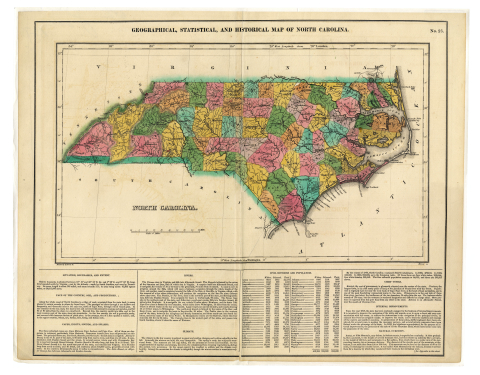A circuit court was a court that held sessions in multiple locations within a region. The judge and sometimes lawyers rode on horseback from town to town to hold court. As a state Superior Court judge, it was part of Murphey's job to "ride the circuit."
While a Superior Court judge riding the "circuit" in southeastern North Carolina, Archibald Murphey wrote this letter to his friend Thomas Ruffin. In it, he describes the region's people as "lazy, sickly, poor, dirty and ignorant," but he blames the lack of education and trade for their faults.
Fayetteville. 25th. April 1819.
My Dear Friend.
…
Thank God! my Circuit draws to a Close. I am fatigued with doing Nothing, for We have had little, very little to do. This Course of Life will render me indolent and good for Nothing. I have employed my Time between the Courts in riding over the Country and learning its Topography: and I know ten times as much of the Topography of this Circuit, as the Men who have lived here fifty Years. I had no Idea that we had such a poor, ignorant, squalid Population, as I have seen. Who that sees these People, and those of the Centre and the West, can wonder that we wish to have a ConventionReformers were pushing for a convention to amend the state constitution, but that (like the rest of Murphey's proposed reforms) would not come to pass until the 1830s.? In the Towns are found, decent and well informed Men in Matters of Business, Men who look well and live well. But the Mass of the Common People in the Country are lazy, sickly, poor, dirty and ignorant. Yet this is a Section of the State, upon which the Hand of Industry would soon impress a fine Character.
I am a good deal disheartened at the Decline of the Cape-Fear Trade. None are so blind as those who will not see. I thought it as plain as Truth itself, some time Ago, that this Trade would decline, and that Fayetteville would become an insignificant Village, if Improvements were not speedily made for bringing the Trade of the Deep and Haw Rivers, and of the Pedee, to the Cape Fear. Whilst the People of the Dan are uniting their Energies to open to the Tobacco Trade a new direction; and the People of South Carolina are pouring out their Treasures to draw to themselves the Commerce of the Catawba and the Pedee, People here, are wondering Why the Planters have not brought in their Tobacco and Cotton: are squabbling about the Canal; making War upon the CompanyThe company set up to build a canal., and really (with the exception of Mr. McNeil, HearsayGeorge T. Hearsay, a Fayetteville merchant., Branson and a few Others), believing that the Tobacco and Cotton are still in the Planters Hands, and not in Norfolk and Charlestown. It is a fact, 'tho' it is very unwillingly acknowledged, that not more than one third of the usual Quantity of Tobacco, and scarcely one half of the Usual Quantity of Cotton have come to the Cape Fear this Season. I wish our Friends did not own so much Property here. I fear there is something in the Character of the People here, so radically at War with that Union and Energy, which the present Crisis requires to save Fayetteville, that the place will go to Ruin. She has many Advantages, if she would improve them.…
Yours. Affecty.
A. D. MURPHEY.
